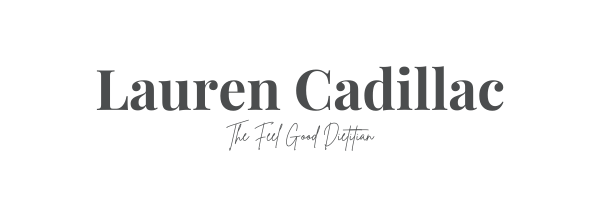Easing Anxiety with Nutrition
/Easing Anxiety with Nutrition
This post is not to be interpreted as a “cure” for anxiety. Anxiety is a complex and multi-factorial. Nutrition however, may a play a role in easing some of the symptoms. Worrying about your food TOO much though can cause anxiety. These tips are all things to ADD in to support your body. If you are experiencing anxiety, please be sure to seek the help of a qualified mental health professional. If you are experiencing anxiety around your food, I’d recommend working with an Intuitive Eating counselor to heal your relationship with food.
Eat Protein at Breakfast (most meals throughout the day)
Protein can help you feel fuller longer and helps to stabilize blood sugar level so you have more energy throughout the day. Protein is also necessary for the production of dopamine and serotonin (neurotransmitters that make you feel good!). Good sources of protein include: eggs, chicken, fish, turkey, pork, beef, tofu, beans and greek yogurt.
Choose Complex Carbohydrates
Complex carbohydrates may increase serotonin (a neurotransmitter that has a calming effect) levels in the brain. Choose foods rich in complex carbohydrates such as quinoa, wild rice, oatmeal and whole grain sprouted breads.
Increase Your Water Intake
Dehydration can affect mental status and mood. Dehydration has been linked to a raise in cortisol (the stress hormone) levels. Keep a water bottle on your desk or in your bag as a reminder to drink up!
Mind Your Minerals
Magnesium can have a calming effect on the body. Incorporate high magnesium foods such as nuts, seeds, legumes and leafy greens such as swiss chard, spinach and kale. Foods rich in zinc, such as cashews, grass-fed beef, egg yolks and oysters, have been linked to lower anxiety.
Include Prebiotic and Probiotic-rich Foods
Probiotics are important for a healthy gut microbiome. Studies show that fermented foods that contain probiotics, protect against social anxiety. Include probiotic-rich foods such as kefir, kombucha, organic sauerkraut and kimchi. Prebiotics are basically food for probiotics. Prebiotics can be found in the following foods: onions, garlic, leeks, asparagus, banana, apple and chicory root. You can also add in a good probiotic supplement. This is my favorite one.
Choose Omega-3 Rich Foods
Omega-3 fatty acids may also reduce anxiety as well as improving depression. Include flax seeds, chia seeds and wild-caught fatty fish like wild Alaskan salmon. Most people would benefit from adding in an fish oil supplement. If you are taking blood thinners, consult your doctor before taking one.
Limit / Avoid Caffeine and Alcohol
Caffeine can make you feel jittery and nervous, interfere with sleep and dehydrate you. Excessive caffeine intake can fatigue your adrenal glands and elevate the stress hormone cortisol. Adrenal fatigue is associated with other health problems such as high blood pressure, IBS, stomach ulcers, acid reflux, and Crohn’s disease. Drinking alcohol may seem like a good way to calm your nerves, but in reality, it causes spikes and dips in blood sugar, dehydrates you, and causes impaired brain function—all of which can lead to anxious feelings. This may in turn make you want to drink even more. You can see the vicious cycle.
Include Antioxidant-Rich Foods
A lowered total antioxidant state is thought to be correlated with anxiety. Including antioxidant rich foods in your diet may help relieve some anxiety symptoms.
Fruits: Apples (Gala, Granny Smith, Red Delicious), prunes, sweet cherries, plums, black plums)
Berries: Blackberries, blueberries, strawberries, cranberries, raspberries
Beans: Pinto, red kidney
Nuts: Walnuts, pecans
Vegetables: Artichokes, kale, spinach, beets, broccoli
Spices: Turmeric and ginger


